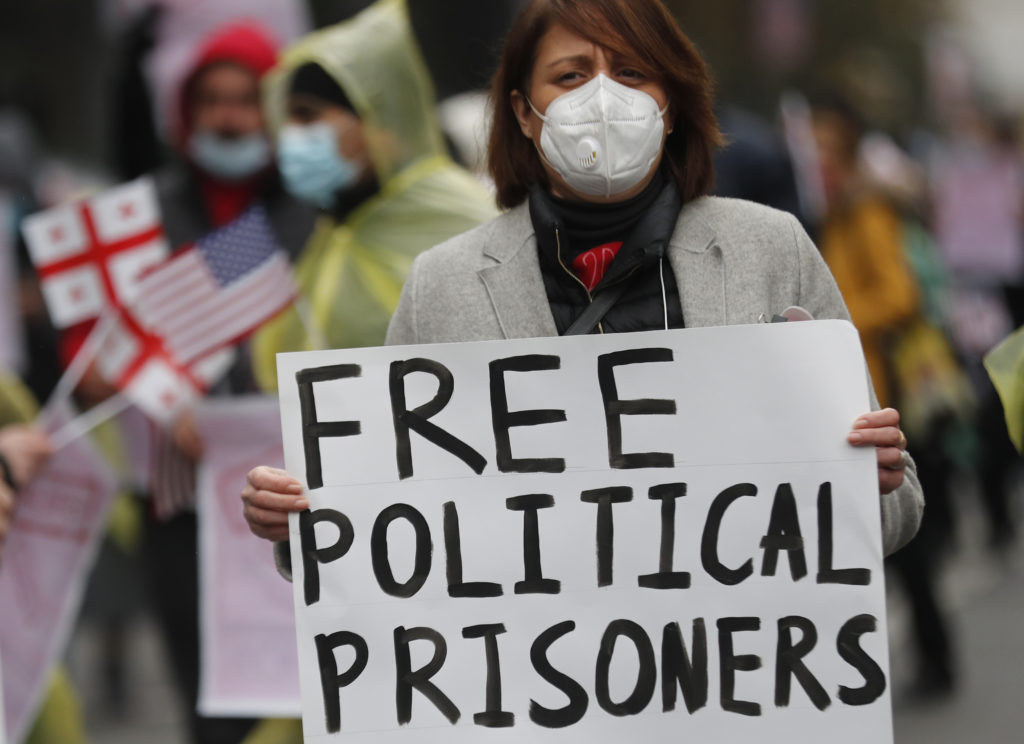Georgia’s ruling Georgian Dream party and some opposition leaders signed an EU-mediated agreement late on Monday, in a bid to end a political crisis that threatens to derail its already vulnerable economy.
The biggest opposition party, United National Movement, as well as some others, refused to sign the deal, although two politicians from these parties signed the document individually.
“This is a historical day and we are looking forward to working together in the parliament,” Archil Talakvadze, the parliamentary speaker from the ruling party, said after signing ceremony attended by Georgian President Salome Zurabishvili, the EU Ambassador to Georgia Carl Hartzell and the U.S. Ambassador to Georgia Kelly Degnan.
The agreement brings the number of MPs in parliament to 113, which equals the constitutional majority in a 150-member body.
The government and the opposition have been trying to reach a consensus on ending the deadlock for several months. The European Union even sent a high-ranking diplomat to help mediate talks, but they proved unsuccessful. The EU then warned Georgia it may suspend its financial aid to the country unless a solution is found, and has displayed an unusual amount of frustration with Tbilisi.
Opposition supporters demanded new elections, insisting that last year’s contest was rigged, and have boycotted parliament. The situation has paralysed a system already overwhelmed by the COVID-19 crisis, which has hit Georgia’s tourism-reliant economy especially hard. The ex-Soviet country has been hurt far more than many other regional neighbours because of its heavy reliance on tourism, which has been at a standstill for more than a year. The protests intensified after last year’s parliamentary election.
Another issue at the negotiation table was the release of opposition leader Nika Melia, who awaits a court verdict, and Giorgi Rurua, an opposition supporter and a shareholder of pro-opposition TV channel Mtavari Arkhi.
Earlier on Monday Georgia’s President Salome Zurabishvili said she was ready to pardon Giorgi Rurua, who was sentenced to four years in prison.
Zurabishvili said she would sign a decree pardoning Rurua only if an agreement between the government and the opposition was reached and signed, and international mediators confirm the deal. Rurua was arrested in November 2019 on charges of illegal purchase, storage and carrying of weapons. He was sentenced to four years in prison. The opposition regards his arrest as politically motivated.
Zurabishvili said that she did not consider Rurua to be a political prisoner, but “ending the political crisis, and concerns for the country’s stability take higher priority than her personal views.”
“With that in mind, I am ready to make a decision scandalous also for myself,” Zurabishvili said in a statement.
The President’s pardon does not include Melia as his verdict has not yet been announced.
Melia, the formal leader of the UNM, was arrested in February for refusing to pay a bail charge imposed on him after he ripped off a monitoring tag during an opposition protest in November, soon after a parliamentary election that government critics say was unfair. He was initially charged for inciting violence during anti-government protests in June 2019, which later turned violent. He claims the charges were politically motivated.
The UNM leaders said that they would start thinking about entering parliament only after Melia’s release.
European Council President Charles Michel, who has initiated talks between government and opposition and offered them a solution document, plans to visit Georgia on Tuesday.
The continuing anti-government protests presented Georgia with its biggest domestic challenge in years. International observers said the vote was “competitive and, overall, fundamental freedoms were respected,” but they also cited pervasive allegations of pressure on voters, and added that there were widespread reports of vote-buying.
The situation worsened earlier this year when Prime Minister Giorgi Gakharia quit in February after a court issued an order to arrest Melia. Gakharia indicated that the court order was dubious, and cited the possibility of disorder in the country.

